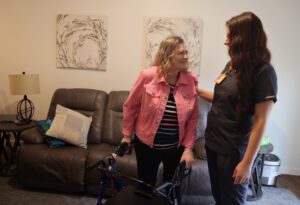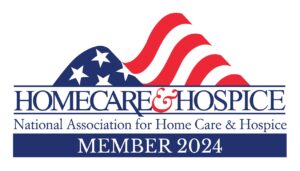Learn How to Be a Better Caregiver With Advice from Our Home Health Agency
It can be frustrating and exhausting to care for family members who are sick or need extra help with day-to-day tasks. Not only do family caregivers sometimes feel like they are sacrificing their own wellbeing, but existing relationship dynamics are at play.
Fortunately, you can make strides toward improving the patient-caregiver relationship, even when you’re related to the person you’re caring for. The skilled home health agency care professionals at Phoenix Home Care & Hospice offer their advice so that you can approach your caregiver role with a renewed sense of passion and love.
Consider these five ways you can improve your relationship with your loved one.
Be Respectful, Patient, and Compassionate
Although these three traits are similar, they are composed of very different actions that define them.
To be respectful means you show consideration or regard for your loved one. To be patient means you’re accepting and tolerant without showing irritation or annoyance. And to be compassionate means you show sympathy and concern for others.
These three traits combined help your loved one understand that the care you provide comes from a good place – and by living these characteristics, you’ll feel more peaceful during the hours and days you provide care.
Communicate Openly and Listen Actively
Home health agencies and hospice care providers send nurses to your loved one’s home to provide the medical assistance they need to live fulfilling lives. During their training, nurses learn how to communicate with patients so that they understand what is happening, why it is happening, and what to expect.
Open communication is essential in a patient-caregiver relationship of any kind. It can include conveying information like the day’s itinerary, explaining the medication you’re giving your loved one, or simply conversing about what your family member needs.
But without active listening, open communication falls by the wayside. Active listening is a communication skill you perform not only by hearing what the other person is saying, but also truly understanding the meaning and intent.
To be a good active listener, you must be fully present in the conversation, not scrolling through your phone or watching TV; make eye contact; notice non-verbal cues; paraphrase and repeat back what your loved one said; withhold judgment and advice; and ask open-ended questions. This tactic works well with people of all ages, whether you’re the caregiver for your elderly parent or your young child.
Don’t forget that as the caregiver, you also can convey your needs in a way that fosters open communication. To protect the relationship you’ve built and prevent frustration from building up, ask other family members to step in to give you time for respite.
Participate in Their Favorite Activities
A great way to improve the patient-caregiver relationship, according to our home health agency experts, is to participate in your loved one’s favorite activities right along with them. This can be as simple as watching a beloved television program, coloring, crafting, taking a walk, fishing, performing minor home repairs, and much more.
Spending quality time with the person you care for can help build a rapport, and it gives you a topic to talk about, too, when you’re short on conversation starters.
Provide Encouragement
Humanity thrives on encouragement and words of affirmation. Positive relationships are built on such things. Encouraging your loved one, especially if they’re struggling with a new medical diagnosis or are feeling depressed or sad, can help improve their mood and outlook. Your well-placed positivity can be inspiring as they heal or recover.
Know When to Hire for Home Health Care Near You
Sometimes, the level of care our loved ones need exceeds what we can safely provide. Attempting to provide it can cause undue stress on both the patient and the caregiver, and your lifestyle can suffer as a result.
Knowing when to call a home health agency, private duty care, or hospice care provider near you is another way you can protect your relationship with your loved one while you serve as their caregiver. Even if you have the skills to continue caring for your loved one, you may want to request private duty care for a day each week so you can get much-needed respite and maintain your relationship with your loved one.
If you’re struggling to live your own fulfilling life with your loved one who needs support from a home health agency, then it’s time to make a very important phone call.
Learn How Phoenix Home Care & Hospice Can Help You
To learn more about the services your loved one may be eligible for in Missouri, Kansas, or Illinois, contact Phoenix online or by phone. One of our care experts will talk to you about your options for helping your family member stay healthy, recover, or protect their dignity.






